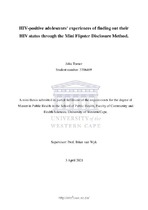| dc.contributor.advisor | van Wyk, Brian | |
| dc.contributor.author | Turner, Julia | |
| dc.date.accessioned | 2021-08-16T09:05:18Z | |
| dc.date.available | 2021-08-16T09:05:18Z | |
| dc.date.issued | 2021 | |
| dc.identifier.uri | http://hdl.handle.net/11394/8330 | |
| dc.description | Magister Public Health - MPH | en_US |
| dc.description.abstract | Despite the known benefits of adolescents knowing their HIV status, parents and caregivers (PCG) often delay the disclosure of their children’s HIV status to them due to the fear of stigma and discrimination, the belief that the child thinks they will die, and the lack of disclosure skills. This delay can affect the children’s adherence to treatment, physical health, mental health and can enable unknowing transmission. The Mini Flipster Disclosure Method (MFDM) was developed to assist healthcare workers (HCWs) in supporting the disclosure of an adolescent’s HIV status by their parent or caregiver. This involves a process of educating the child or adolescent about HIV and how it can be successfully managed before informing them that they have HIV. The current study described the experiences of HIV-positive adolescents of the MFDM and those of their caregivers and HCWs in Mpumalanga. | en_US |
| dc.language.iso | en | en_US |
| dc.publisher | University of Western Cape | en_US |
| dc.subject | Adolescents | en_US |
| dc.subject | Antiretroviral therapy | en_US |
| dc.subject | Disclosure | en_US |
| dc.subject | Stigma | en_US |
| dc.subject | HIV | en_US |
| dc.title | HIV-positive adolescents’ experiences of finding out their HIV status through the Mini Flipster Disclosure Method. | en_US |
| dc.rights.holder | University of Western Cape | en_US |

